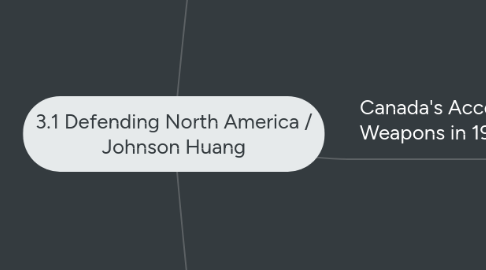
1. Scrapping of the Avro Arrow
1.1. For
1.1.1. The building and manufacturing of the Avro Arrow was far too expensive. It had cost $12 million for a single aircraft.
1.1.2. The world has already began to utilize long range missiles and the use of interceptors such as the Avro Arrow was declining.
1.1.3. The Avro Arrow was built to chase bomber planes, but that has also declined, therefore it is unlikely to be sold to other countries.
1.1.4. The overall cost of the Avro Arrow was about $1 billion dollars, which far exceeded the national defense budget. Without the economic backing, the Avro Arrow had to be scrapped.
1.2. Against
1.2.1. The tax money went into the production of the Avro Arrow went over $400 million dollars. Scrapping it will only put the money to waste.
1.2.2. Thousands of jobs created by the manufacturing of the Avro Arrow will be destroyed and people will be left unemployed because of the scrapping of the Avro Arrow.
1.2.3. A new Iroquois engine was expected to break world speed records and put Canada onto the international technological stage. The scrapping had kept Canada from being an international leader of technology.
1.2.4. The scrapping of the Avro Arrow gave back a total revenue of just over $4000, which is ridiculous considering the enormous cost and tax money that went into the project. The material was wasted and melted into pots and pans.
1.2.5. The engineers and scientists that worked on the Avro Arrow went into the United States for work. This would deplete Canada of some of the brightest and smartest minds in the technological field.
2. Canada's Acceptance of Nuclear Weapons in 1963
2.1. For
2.1.1. The Bomarc Missiles are made to carry Nuclear warheads, and since the money had already been invested into the missiles, Canada should acquire nuclear warheads.
2.1.2. Canada's defense should be a top priority, and an example of a need for Nuclear weapons is the Cold War, if the United States didn't have Nuclear weapons to deter the soviet union, there would have been a war.
2.1.3. As a country that is abundant in natural resources, Canada can be a very viable target for those who seek those resources. Nuclear Weapons is different from other weapons such as jets simply because of its nature and it would be a more than sufficient deterrent.
2.1.4. The United States wanted Canada to have a united front with them, meaning a united nuclear defensive front. By not accepting the Nuclear weapons, international relations could be at risk and be damaged.
2.2. Against
2.2.1. Nuclear weapons are capable of mass destruction. Holding weapons like these are inhumane and un-humanitarian. War has already caused millions of deaths, and technology advancements should stray from destructive purposes.
2.2.2. Canada was involved in the United Nation's activity of Nuclear Disarmament. Therefore acquiring nuclear weapons for ourselves would have been hypocritical.
2.2.3. The involvement of Nuclear Weapons could actually endanger Canada as a country. Canada has consistently been a middle power, who has been trusted to make the just decisions because of its lack of superpower-like weapons. Obtaining nuclear weapons can dramatically shift Canada's position in the world and potentially be seen as dangerous by other countries.
2.2.4. Obtaining nuclear weapons would have only created a sense of false security. The possession of the nuclear weapons can be a difficult subject when negotiating diplomatic terms, because it indicates a strong sense of military intervention.
3. Canada's Role in the Cuban Missile Crisis
3.1. For
3.1.1. Canada needs to be involved on the international stage and prove that it is a country capable of contending with other powers instead of being simply a bystander.
3.1.2. The missiles positioned in Cuban was a very present threat due to the fact that all of the early warning systems of the United States and Canada were built ot anticipate an attack over the North Pole. An attack from Cuba could cripple North America and is highly dangerous.
3.1.3. The United States requested Canada's assistance. By refusing, U.S-Canada relations will be damaged.
3.1.4. An astonishing 80% of the Canadians, taken by a poll, wanted Canada to be involved in the Cuban Missile Crisis along side the United States. Being a democratic country, the government should be a reflection of the people's wills.
3.2. Against
3.2.1. Positioning troops in Cuba and putting Canada into DEFCON3 could potentially provoke the Soviet Union and tip the balance of the stalemate into a full fledged nuclear war.
3.2.2. A priority of Canada and the United Nations should be to resolve the issue with diplomatic actions and not resort to war immediately. The United Nations diplomats are highly capable, and this issue could be resolved without bloodshed.
3.2.3. Canada should be an independant nation and not be swept into situations that the United States had caused. Canada should be strict with its foreign affair involvement to prevent any deaths of Canadian troops.
3.2.4. The investigations in Cuba did not have solid evidence due to fact that the investigations were solely by the United States. Therefore it is better to send United States representatives to inspect the situation before going into DEFCON 3 and becoming active in the animosity between the Soviet Union and the United States.

